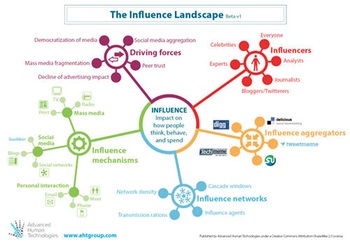This year, the Future of Media Summit has been replaced by the Future of Influence Summit. It’s next Tuesday 1 September, Sydney time. I’ll be going, and I can offer you a discount.
Summit-master Ross Dawson has changed the name because he reckons that influence is the future of media.
Ross writes:
We have already begun to discover this through the now-dominant concept of “social media”. In the Future of Media Strategic Framework that was launched for our Future of Media Summit 2006 we described the (symbiotic) relationship between Mainstream Media and Social Media.
Social media is all about human relationships, about how we shape our view of the world based on our peer communication. The extraordinary breadth of information and opinion that we are exposed to today, combined with the ability to converse, means our own opinions are often driven more by peers than traditional sources.
In fact this shift to the social means that media is becoming far more about peer influence than information and reporting.
This year companies globally will spend US$450 billion on advertising. The composition of advertising spend has changed dramatically over the last decade. That pace of change will rapidly accelerate in coming years. Total marketing spend is hardly set to reduce in an increasingly crowded marketplace, but it will be allocated to those activities that truly make a difference. Influence — based on conversations and aggregated opinion — will be at the centre of how companies seek to drive sales and customer engagement.
Today, people find content such as movies, music, news, books and so on primarily through aggregated channels. Instead of buying the New York Times and reading it cover to cover, people are pointed to the most relevant articles in the New York Times and elsewhere, based on what people find interesting. It is hardly new that people buy music or books because of recommendations — but now adding to their friends’ opinions and magazine reviews are a universe of influencers who provide guidance on what to buy. Influence is driving the world of content and publishing as never before, and this is just the beginning.
Last year’s Future of Media Summit was full of old media journalists and managers in denial.
It triggered my controversial essay Note to “old media” journalists: adapt, or stfu! (parts of which were even translated into French in Le Monde), a wonderful response from the MEAA’s Jonathan Este, and furthers writing from me including the essays “Trouble at t’paper” and Sunday Thoughts about Journalism.
A year later, a lot has changed — although my liveblog from Media 09 still reads as pessimistic. I’ll be interested to see what emerges, and to prepare myself I’ll be reading more of Ross’ blog over the next couple of days. Expect further posts.
Meanwhile if you want to register for the Future of Influence Summit, you’ll get 20% 25% off if you use the discount code TIESTIL.


